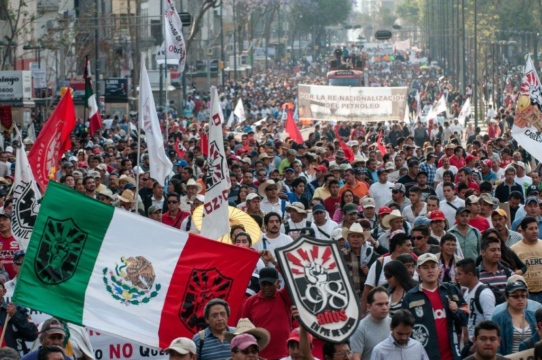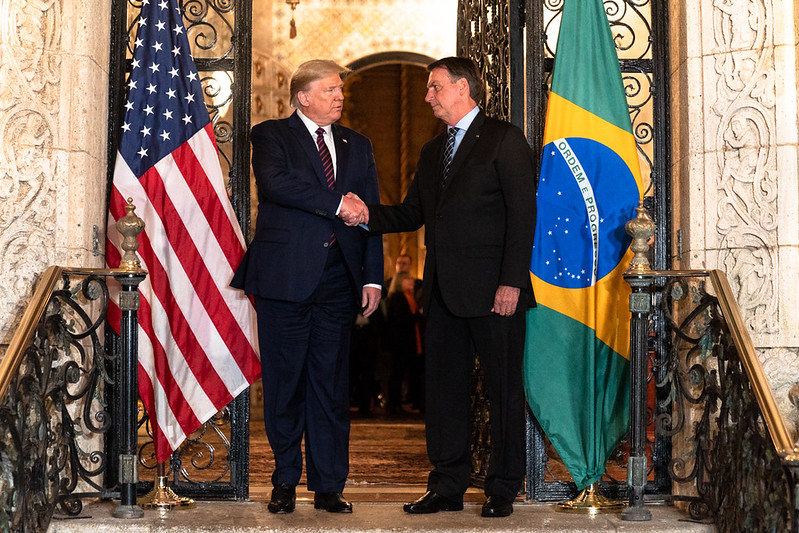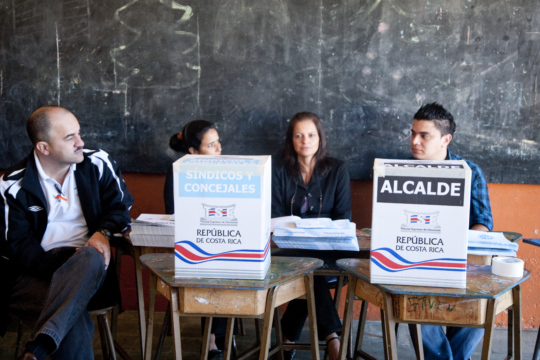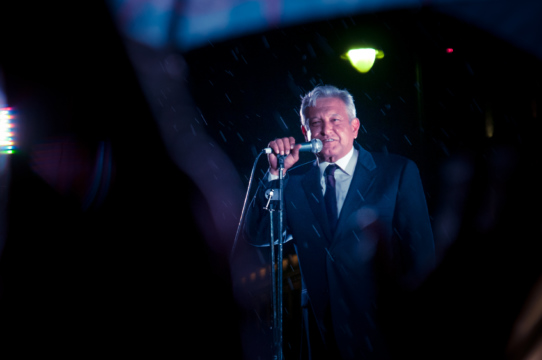
Latin America’s energy reforms will be tested in upcoming elections
2018 will be a pivotal year for energy in Latin America, as the region’s top oil producers are set to hold presidential elections that could lead to sweeping policy changes.
As the world wrestles with the public-health threat of Covid-19, the response of Latin American countries has varied widely, from lockdowns to laissez-faire. The actions, or lack thereof, of the presidents of the region’s two biggest countries, Mexico and Brazil, have drawn particular scrutiny, casting a fresh spotlight on populism in Latin America and its particular vulnerabilities in the face of a global pandemic. Populism’s failure to adequately address the pandemic could provide a sorely needed opportunity for political parties and politicians to bolster democratic institutions and regain citizen trust.
The presidents of Mexico and Brazil have been widely criticized for ignoring health professionals, attending rallies, and refusing to shut down public events. While both countries have health systems that are among the most prepared in the region to combat the crisis, their populist leaders are hampering this readiness. The two heads of state are opposed ideologically, but their shared anti-science, anti-expert rhetoric, and a belief that they know best have exposed the factors that can make populist countries weaker in the face of an epidemic.
In Mexico, leftist President Andrés Manuel López Obrador (AMLO) has transformed the program that provides state-subsidized coverage for health care into the Instituto de Salud para el Bienestar. The new system has had a number of operational and programmatic issues in the short time it has been in function. AMLO’s appointee to head the program, Juan Antonio Ferrer, has no background in medicine or epidemiology. The government also cut funding to the program to use in other areas, leaving the system weaker than before. OECD guidelines say Mexico should be spending 9 percent of GDP on health services when they currently spend only 5.5 percent.
To make matters worse, in incidents that have become widely circulated by the press and social media, AMLO ignored health experts and went ahead with public rallies and events. He was slow to implement procedures in line with the rest of the hemisphere, and continued to go out into crowds, hugging and kissing citizens. He attacked the opposition who were critical of how he was handling the epidemic saying, “[t]hey want us to get infected.” In one eyebrow-raising episode, the president held up two amulets at a rally, presumably to show he was defended from Covid-19 by these “protective shields.” His deputy secretary of health further added to the myth of AMLO’s invincibility arguing “that AMLO’s over 60 years old doesn’t mean he faces specific risks.” While the president finally introduced social distancing measures, suspended nonessential activities, and announced a state of emergency, his delay to act and instead dismiss the danger of the pandemic is a major setback for Mexico.

In Brazil, the right-wing populist Jair Bolsonaro was also sluggish to take the spread of Covid-19 seriously. While members of his delegation tested positive for the virus after a Mar-a-Lago trip in the United States and were thus put into quarantine, Bolsonaro defied doctors’ advice to stay home, and instead turned out to a pro-government and anti-Congress protest. At one point, Bolsonaro claimed the spread of the disease was a “fantasy” created by the media to hurt his government. Last week in an address to the country, Bolsonaro compared the disease to the flu and claimed that if infected, his history as an athlete would save him from its effects. And unlike AMLO, Bolsonaro has refused to back down and continues to criticize quarantine measures against the advice of his Health Minister Luiz Henrique Mandetta. According to
some reports, the president is unhappy with Mandetta, a doctor who has spoken out against the government’s response to the pandemic, and whom some members of the government say is “too technical.” Mandetta recently announced that the health system would collapse by the end of April on account of the crisis.
The reactions of AMLO and Bolsonaro to Covid-19 exemplify some of the riskier characteristics of populist leaders, including the tendency to value loyalty over institutional knowledge in government, and to paint scientists and other experts as elites. Cas Mudde’s definition of populism, that of an ideology that categorizes society in two groups of “the pure people” and “the corrupt elite” gets to the core of this issue. In the middle of a pandemic, reactions from scientists and professionals that conflict with the leader’s narrative are unwelcome. Look no further than the United States, where President Trump has similarly clashed with public health officials and downplayed risks of the disease, initially calling it the Democrats’ “new hoax” and later arguing that the country should reopen after just 15 days of social distancing and with Covid-19 cases and deaths on a steep upward curve. Trump, like AMLO, has reversed course on some of his earlier comments and is now calling for extended mitigation efforts.
For both AMLO and Bolsonaro, the human impact and political consequences of taking a cavalier approach to the Covid-19 emergency remain to be seen. Recently, protests erupted against Bolsonaro at night as thousands banged pots and pans and chanted “Bolsonaro out.” AMLO’s approval rating declined from 55.6 percent in February to 51 percent on March 23, largely due to poor economic performance and a failure to reduce violence. His early missteps in handling the crisis could jeopardize his public support if Mexico’s unorthodox approach fails.
However, both leaders thrive on cultivating a narrative that puts them at the center, and bolsters their image of standing up for the people against a hostile elite. This time may be no different. Moreover, as Kevin Casas has observed, the conditions created by the Covid-19 crisis, including sharp economic downturns, calls for restricting civil liberties, and a likely backlash against globalization, would seem to favor authoritarian populists. Due to the impact of Covid-19 and the drop in the price of oil, Credit Suisse predicted that the Mexican economy will contract four percent this year. In Brazil, the Economy Ministry revised its economic outlook to zero percent growth, which some economists call optimistic.
In contrast to past economic and social crises that brought populists to power in Latin America—Venezuela in the late 1990s, Argentina in the early 2000s, and Bolivia in the mid-2000s, to take a few examples—it is now the populists themselves who will preside over the turmoil of the coming months and own at least some responsibility for how Brazil and Mexico respond to it. Could this actually lead citizens to turn away from populist politics, in defiance of historic trends?
A recently published white paper by Stanford University provides recommendations to traditional center-left and center-right parties to “reclaim their role as the mainstays of democratic competition” and guard against populism. Mexico and Brazil comprise two very different party systems, where AMLO’s movement MORENA holds a majority in both houses and Bolsonaro’s party holds roughly 10 percent in the lower house and in a highly fragmented system. Brazil’s political parties therefore have greater leverage against their president and capacity to act without him than those in Mexico. Still, a number of these suggestions could prove relevant in both countries as political parties and leaders seek to respond to populist appeals amidst the coronavirus pandemic. These include:
1) Changing political rhetoric to defend democratic institutions and the rule of law. Parties need to voice their unwavering support for regulatory agencies, independent courts, the free press, and elections that are free and fair, especially if populist leaders are demonizing these institutions. During the current crisis, this starts with parties that support health professionals in the government. The Brazilian speaker of the lower house of Congress, Democrat Rodrigo Maia, criticized Bolsonaro and asked the federal government to recognize the important work of governors and public health experts.
2) Parties on all sides need to come together to call out the insufficient responses and nonchalant behavior of AMLO and Bolsonaro during the pandemic. In Brazil, governors have implemented emergency orders due to the spread of the disease in direct defiance of Bolsonaro. Following Covid-19, parties should continue to condemn populist attacks on the press and on civil society.
3) Provide meaningful alternatives for economic and social policy between parties. Policy convergence in the past, especially when left-wing parties adopt neoliberal economic policies, has caused many voters to pursue populist politics where they do not see their views represented. In Mexico and Brazil, which both face economic recessions, the challenge is for parties to come together in the short-term to push for widespread social and economic policies to fight Covid-19, but redefine their platforms post-pandemic to provide distinct proposals for ideologically diverse voters.
Covid-19 has exposed the propensities of populist forms of leadership that are averse to expertise, evidence, and good governance. Whether populism’s resurgence endures in a post-pandemic world lies, at least in part, in how political leaders and parties in Latin America’s biggest countries respond to the challenge of this moment and whether they can effectively articulate an alternative vision.
Covid-19 in the Americas: The Dialogue’s Coronavirus Updates
Covid-19 in the Americas: The Dialogue's Coronavirus Updates
2018 will be a pivotal year for energy in Latin America, as the region’s top oil producers are set to hold presidential elections that could lead to sweeping policy changes.
Could anger about corruption and lack of trust in institutions bolster a new wave of faith-driven politics?
López Obrador’s presidency will be judged by his ability to tackle the myriad problems that beset his country while showing that change is possible within the rule of law and democratic institutions.

